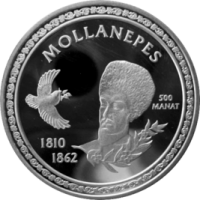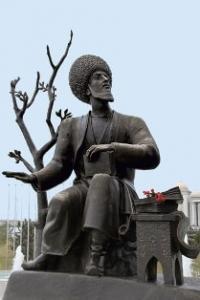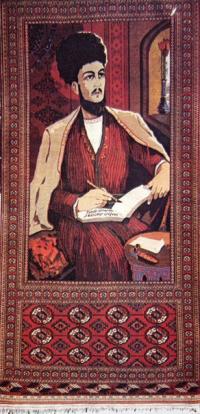You are here
Mollanepes.




Specialized excursion around Turkmenistan.
“Remember everyone: be skillful in any work!
Do not confuse a friend with an enemy, always be busy with business!
Always be mighty, fresh in soul and body!
Than a century to be a camel, even a year be bold!
Do not tease the hostile and do not incite to a fight,
But, having pacified one, do not let the other cheat;
Do not be afraid, but chickened out - run, do not fall, do not get tired!
Do not appeal to the insignificant "jan aga" in madness!
Than a century to be a camel, even a year be a nerdy brave!
Nepes, in order to be better - keep a high covenant:
Beggars and money changers do not try to ask for coins!
From such requests, in a moment, God's light will not be nice to you,
It is not given to a husband to conceive, he will not give birth even at a hundred years old,
Than a century to be a camel, even if a year be brave! "
Excursion walks in Turkmenistan.
Mollanepes Kadyrberdy oglu (circa 1810, near Serakhs, Iran - 1862), Turkmen poet and musician. He studied at the madrasah. He was a teacher and master jeweler. The main genres of poetry by Mollanepes Kadyrberdy oglu are love and (to a lesser extent) civic lyrics.
As a master of words, he creatively enriched the images that had become traditional, introducing pictures of everyday life and native nature even into such a canonical genre as love lyrics. The author of the lyric poem "I Have Come" and the dastan "Zohre and Tahir", which can be considered a literary adaptation of the folk version.
"Takhir and Zohra", which is common among the Turkic-speaking peoples of Central Asia and the Volga region, as well as in Azerbaijan and Turkey. The plot is similar in many versions; this is the tragic story of the betrothed, who are separated by the evil will of the padishah, the girl's father.
The ideological basis of the versions that developed in the feudal era is the struggle for justice. The Uzbek version has retained the elements of fiction inherent in myth-making. The plot of "T. and Z. " first literary processed by an Uzbek poet of the XVIIth - XVIIIth centuries Sayiodi.
In Turkmenistan, there are two versions of the plot “T. and Z. " - oral-poetic and literary treatment called "Zohra and Takhir", created in the XIX century Mollanepes. "Lord of the land of love", "king of eternal love", "king of love lyrics" - it is not easy to translate the title that the Turkmen people awarded to one of their most outstanding poets - Mollanepes, whose 200th anniversary is celebrated in Turkmenistan this year. Mollanepes is considered an unsurpassed master of the lyric genre.
And although other classics of Turkmen poetry also wrote about love, in their work, as a rule, patriotic, military, Sufi themes, problems of social injustice and issues of understanding history occupy a central place.
Well-read, fluent in several languages, Mollanepes not only made love the main subject of his lyrics, but also gave a new development to the chosen genre, using both the experience of his compatriots, especially the great Makhtumkuli Fraghi, and the literary heritage of the Turkish, Uzbek, Azerbaijani and other peoples.
Little information has been preserved about the life of Nepes, who over the years received a prefix to the name - Molla (teacher). Most of the data was obtained directly from the works of the author and from Oguljahan eje, who told a lot about her maternal great-grandfather.
Born in 1810 into a wealthy family, Mollanepes graduated from a rural school, continued his studies at the Mary Madrasah, and then was sent by his father to the most prestigious educational institutions of Bukhara and Khiva.
Returning to his native land, the poet began to teach at school, was engaged in agriculture and jewelry business. After some time, he married the beautiful girl Bossantech, who gave him two sons - Muhammadrahim and Resula, the eldest of whom, by the way, followed in the footsteps of his father and also wrote poetry.
Nepes discovered his poetic talent at an early age and was highly appreciated by another Turkmen classic, Kemine. As the poet's great-granddaughter said, they often organized a kind of "poetry evenings", and Mollanepes not only read his poems, but also performed them to the sounds of a dutar, being also a gifted bakhshi - musician-improviser.
Mollanepes's poems about love are notable for their drama, they not only sing about female beauty, but there is a constant struggle between passion and reason, desire and a sense of duty, bliss and longing. "The poet revels in the storm of his emotions:
I, Nepes, laugh, cry, then hoping, then sad,
I bloom with a bud, then I dry up, not joking,
I am dying, I am resurrecting - oh, beautiful child!
My love is a thorny, but desired path! "
In his ardent poems we hear the noise of the blood of lovers and the rustle of brocade, gentle whispers and sweet vows. The lyrical hero of Mollanepes is most often a young man who is "rich without gold" with his love and dreams of reciprocity, "like a beggar about bread."
And even if his beloved appeared only for a minute, giving one single gentle look, his soul flutters, "like a moth," "reveling in a wonderful dream." Before female beauty, daffodils and tulips pale, the stars and the moon fade, nightingales fall silent.
Seeing the beauty, the kings lose sleep, the slaves throw off their shackles, and the wanderers find their way. A proud oriental man becomes a "vassal" of his beloved, she makes him obedient, "tied with only one hair of hers," taming him with one wave of eyelashes.
At the same time, the objects of sighing in each poem are all new beauties - with dark or blue eyes, black or golden hair, white or dark skin, in silks or velvet, Turkmen or Persians. It would seem that the image of a family man and school teacher Mollanepes does not correspond to such a romantic list of hobbies
One could argue that the poet describes love in general and female beauty as such, without tying his images to certain fellow villagers. But there is an interesting detail: in the East in those days, poets often wrote poems about specific girls at someone's request.
So, if a young guy fell in love and knew that for one reason or another he could not marry a beautiful woman, and therefore he had no right to speak openly about his feelings, he turned to the poet with a request to write poetry and music about her.
Recognized poets and singers were not forbidden to sing the charms of any girl, and a guy in love could declare his love with such a song "presented" to him. The creative heritage of Mollanepes, according to the latest research, consists of more than a hundred poems and their crowning "stars" - the destan "Zohre and Tahir", created on the basis of folk legends and myths. In the treatment of the classic, the heroes of ancient legends acquired individuality, literally "revived" in front of the audience, and new characters and storylines appeared.
The story of the Turkmen Romeo and Juliet is accompanied by a broad reflection of the social structure of the modern Mollanepes era, which gave the conflict a deeper social character, and the destan itself a special value not only from an artistic, but also from a historiographic and ethnographic point of view.
And the harmonious combination of prose and poetic passages, which were performed alternately in recitative and song form, gave the ancient history a special flavor. Thanks to the “Zohra and Takhir” destan, Mollanepes’s fame spread not only in the territory of Turkmenistan, but also among the neighboring peoples.
At the end of his life, Mollanepes reinterprets the theme of love:
“I was young and stupid,
houghtlessly aspired to idols ...
You thought, heart,
You are the only one in love in the world ...
Do you remember
To whom did you dedicate your songs? Confess!"
“What good is the soul of the beauties of the earth!
Death will draw its bow - and you will forget about them...",
- Mollanepes notes bitterly. He writes several dozen religious works, noting that the time has come "in the highest faith to forget about spiritual anxiety."
“Life is a moment, everything else is eternity,
The fool only does not care about transience, - the poet comes to the conclusion. -
The arrow of fate has already been fired at us...”.
The work of the classics and military-patriotic sentiments did not pass by. It is known that Mollanepes participated in repelling the attacks of the troops of the Iranian Shah Hemze Murzi and played an important role in rallying all the Turkmens in this war, inspiring his people to win.
Until recently, it was believed that the poet was wounded during one of the battles and died of his wounds in 1862. Mollanepes was buried in the Khoja Abdyllah cemetery not far from Mary. The manuscripts of his works, recorded by professional bakhshis, transmitting beautiful lines from mouth to mouth, are now kept at the National Institute of Manuscripts of the Academy of Sciences of Turkmenistan.
In 1941, composer Adrian Shaposhnikov based on the destan "Zohre and Takhir" was created the first national opera, which for many years became the most popular among the people. Today the Turkmen State Academic Theater bears the name of Mollanepes.
To this day, every Turkmen youth who first experienced romantic feelings for the first time invariably refers to his name, finding an accurate reflection of his experiences, dreams and dreams in the imperishable verses of the poet, who sincerely believed that love would save the world.
“A man is great when he finds his own happiness.
He will do thousands of righteous deeds, ”wrote Mollanepes, who, like all geniuses, was looking for heaven on earth, and, unlike many, nevertheless found it... In the arms of his beloved.
Authority:
Ovez Gundogdyev, Deputy Director of the Institute of Archeology and Ethnography of the Academy of Sciences of Turkmenistan, professor. Maria Kolodina.
http://www.turkmenistaninfo.ru







